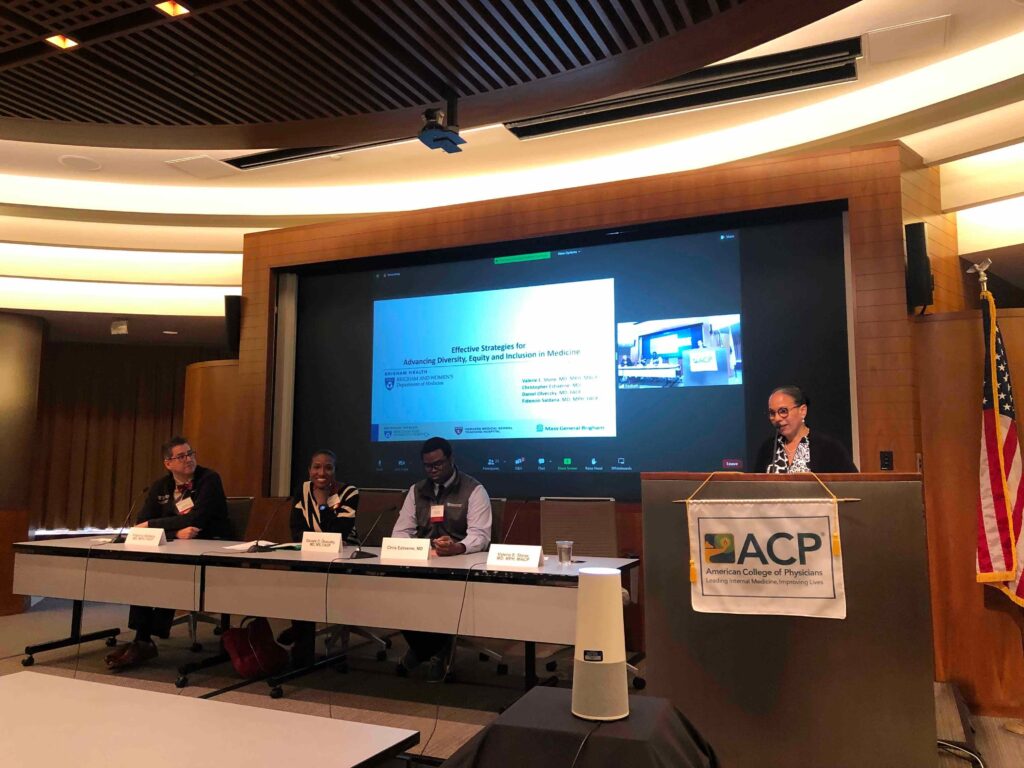History
The Brigham and Women’s Hospital Department of Medicine has a long history of successfully recruiting and training a diverse group of residents. In contrast, however, historically our faculty have not been as diverse, and retention and advancement among our URiM faculty was less than optimal.
With this backdrop, Diversity, Equity, and Inclusion (DEI) was launched as a unified endeavor in July 2019 as part of the Department of Medicine’s Strategic Plan, with the appointment of Dr. Valerie Stone as our inaugural vice chair of diversity, equity, and inclusion. Dr. Stone’s initial goals were to: 1) Continue and build on the Department’s success in diversifying the residency program, and 2) create a new focus on enhancing faculty diversity by prioritizing improved recruitment, retention and advancement of URiM faculty. In 2020, informed by the racial reckoning across the nation, our DEI priorities were expanded to include a firm commitment to anti-racism work across the department.

Key milestones in our journey include:
Our department chair has made DEI among their highest priorities. They have clarified that this is not only about diversity and inclusion, but also anti-racism and that the burden should not be on our URiM faculty and residents to do this work alone. Our chair has also been willing to fund programs needed to combat racism and transform our environment.
Early in our journey, we developed a Diversity Council with senior leader representation from all 22 of our divisions. This council meets to share goals, tactics, and strategies and to identify opportunities for collaboration. This group has spun off several more specialized committees. Nearly half of our divisions now have dedicated DEI committees that advance work locally and share best practices with the department.
Our Residency Program has a dedicated Diversity and Inclusion Committee that addresses issues of diversity, inclusion, racial justice, and anti-racism activities. In addition, our residency added a DEI chief resident in 2020 and in 2021 we selected and hired an APD for Racial Justice and Equity. We also developed a specific mentoring program for our URiM residents in 2021. Our residents have led the way in advancing our department’s commitment to anti-racism.
More recently, we have added an intentional strategy of enhanced recruitment of URiM subspecialty fellows and retention of these fellows as faculty. This work has focused on recruitment, community building, and mentorship to enhance successful transition to faculty for this group of trainees. A key milestone in this work was the recruitment of two faculty leaders to oversee this work as the director and co-director of URiM Fellow Initiatives.
In the fall of 2022, we launched a New Women Faculty Mentorship Circles program to enhance support for this group of faculty. We plan to expand our efforts to advance the careers of women faculty based on the results of this new program.
Since beginning our journey, our diversity has improved through our successes with recruiting and retaining, building community, and supporting the advancement of URiM residents, fellows, and faculty. We recognize, however, that the diversity of our leadership and our senior faculty needs continued attention and are working to address these opportunities.
